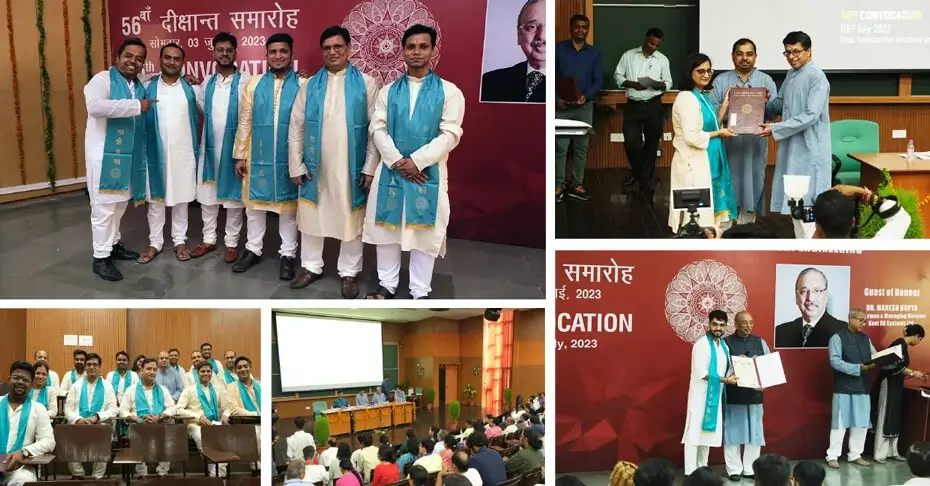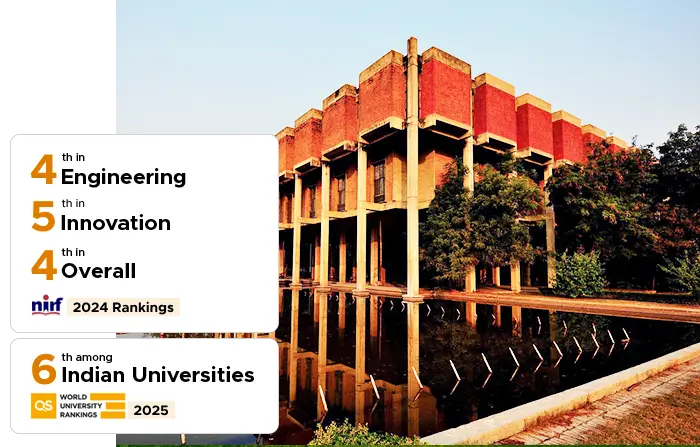The core modules include
1. Energy Sustainability: An Overview
Fundamental Concepts of Energy
- Definitions,
- Basic Thermodynamics,
- Measuring the efficiency of energy systems and units
Historical Perspective of Energy
- Pre-industrial revolution era (before 1900)
- Development of materials, human development, and the quest for energy
- Post-industrial revolution
- before the world war-II (1900-1950)
- after the world war-II (1950-1990)
- Modern era (1990-present)
- Nexus of the materials-manufacturing -engineering - energy and population growth
Environmental Impact of Energy Generation
- Global energy balance, anthropogenic activities, and climate issues
- Carbon emissions with sector wise distribution
- Impact of climate change on energy sustainability
Energy Systems and Utilization in Modern Era
- Modern energy conversion systems
- Overview of conventional and renewable energy generation technologies
- Energy storage technologies
- Comparative assessment of energy generation technologies vis-à-vis present and future energy demand
Energy Consumption
- Major energy usage
- Mobility and electric vehicles
- Steel and Cement
- Manufacturing sector
- Residential
- Energy consumption patterns in rural and urban setting
- Grid issues
Balancing Demand & Supply
- Reducing consumption
- Energy efficiency
- Need to balance demand and supply
- Role of storage technologies
Decarbonization
- Carbon neutral/NetZero: concepts
- Decarbonization pathways
- Need for carbon sequestration and methods
- Energy policies in the context of decarbonization
- Social aspects of decarbonization
2. Energy Storage Materials and Devices
Introduction to Energy Conversion & Storage Systems
- Scope of energy systems
- Needs and opportunities
- Technology overview and applications
Introduction to Batteries
- Primary & Secondary Batteries
- Battery Electrode Reactions
- Important Parameters viz. Operating Voltage
- Charge Capacity
- Maximum Theoretical Specific Energy (MTSE)
- Coulombic Efficiency
- Cycling Behavior
- Transference Number
- Types of Battery Electrode Reactions
- Discharge Curves and the Gibbs Phase Rule
- Binary and Ternary Electrodes
- Phase Diagrams and Discharge Curves
- Cases: Li-Bi, Li-I2, Li-Sb, Li-Cu-Cl
Components of Batteries
- Insertion and convertible electrode reactions in batteries
- Positive electrodes for Li-ion batteries: (Olivine (LiMPO4), LiMO2, Spinel (LiMn2O4), Sulfur and other materials
- Negative electrodes for Li-ion batteries based on insertion, alloying, conversion and alloying-conversion reactions
- Graphite, Sn, Si, and other metal oxides
- Electrolytes for Li-ion Batteries: Requirements, Organic liquid electrolyte, Dry polymer electrolyte, gel polymer electrolyte, solid electrolytes based on Sulfides and Oxides
Battery Configuration & Fabrication
- Conventional batteries with liquid electrolyte
- Passive Components
- All-Solid-State Batteries and other types
- Batteries Based on Other Chemistries: Sodium-Ion, Zinc-Air, Pb-Acid, Ni-Metal Hydride Batteries, etc.
Supercapacitors
- Supercapacitors and its working principle
- Types of supercapacitors
- Criteria of materials selection for electrodes
- Cycling and performance characteristics
- Difference between battery and supercapacitors
- Hybrid battery/supercapacitor energy storage system
- Prospects and challenges
Thermal Energy Storage
- Solar pond
- Sensible thermal energy storage
- Phase change thermal energy storage,
- Thermal analyses of the storages
- Integration with solar thermal systems
Pumped-hydro Energy Storage
- Basic concepts
- Design and preliminary analyses of pumped-hydro energy storage
- System efficiency calculations
3. Solar Photovoltaics
Introduction to solar cells
- History of solar cells, economics, current status, emerging technologies, and recent developments
- Solar spectrum, the concept of airmass
Basics of semiconductors
- What are semiconductors?
- Origin of bandgap
- Direct and indirect bandgap semiconductors
- Intrinsic and extrinsic semiconductors and their properties
Optoelectronic processes in solar cells
- Optical absorption, generation, and recombination in semiconductors
- Charge transport, charge extraction, contacts, continuity equation
P-N junction
- Basics of PN Junction and Band Diagram
- Operation of p-n junction in forward and reverse bias, depletion width
- Drift-diffusion currents, I-V characteristics of P-N junction in Dark and Light
Device characterization of solar cells
- Open circuit voltage, short circuit current, fill factor, efficiency, quantum efficiency, an equivalent circuit of a solar cell, series and shunt resistance, diffusion length, and the effect of recombination processes
- Characterization (I-V testing, solar simulators, EQE, IQE, IPCE, EL, PL imaging etc.)
- Hands-on exposure
Brief overview of different types of solar cells
- First-generation technologies: Primarily Si-based and GaAs + Multijunction
- Second-generation technologies (lowcost):thin films (a Si, CdTe, CIGS)
- Third generation (high efficiency and low cost): Organic and perovskite solar cells
- Multi-junction Cells, BIPV
PV Module Design
- Migration from solar cells to modules to systems,
- BIPV: present status and outlook
PV system design
- Overview of designing a PV system
4. Wind and Hydro Energy
Introduction to wind and hydro energy
- Advantages of green energy
- Potential of green energy worldwide and in India
Fundamentals of wind power
- Overview of wind meteorology
- Wind Data measurements and correlations
- Wind power capture and efficiency in extracting wind power
Wind Turbine Technologies
- Aerodynamics of wind turbines
- Types of wind turbines and applications
- Transmission and power generation systems
Horizontal Axis and Vertical Axis Wind Turbines
- Aerodynamics of HAWT: Momentum methods
- Working principle: Lift Vs Drag based VAWT, Power coefficient
- VAWT Design: Aerofoil choice, geometric, kinematic and dynamic design parameters
- Experimental methods for design and power estimations
Offshore Wind Turbines
- Off-shore Wind Turbines
- Challenges and benefits
Hydro turbines
- Hydrodynamics of hydro turbines
- Safety and Environmental impact
- Mini hydro turbines
Numerical Methodology
- Introduction to Computational Fluid Dynamics
- Numerical Simulation of Wind/Hydro Turbines
- Impact of atmosphere on turbine performances
5. Hydrogen Energy: Generation, Storage, and Utilization
Introduction
- Overview of a hydrogen-based economy/eco-system and hydrogen energy
- Role of hydrogen in decarbonization
- Essential components of the hydrogen energy ecosystem: production, storage, transportation, and conversion
- National hydrogen mission and other initiatives
Hydrogen Production
- Electrochemical methods:
- Electrolysis, basic electrochemistry, device/system design
- Electrolysis of water/ammonia for hydrogen production
- Thermochemical methods:
- Pyrolysis and gasification processes from renewable sources. Thermodynamics and design.
- Thermochemical splitting of water/ammonia Photochemical
- Water splitting
Hydrogen Storage and Transportation
- Fundamentals of methods for hydrogen storage
- Materials, devices, and protocols for hydrogen storage
- Materials, devices, and protocols for hydrogen transportation
Applications/ Utilization of Hydrogen
- Electrical/Electrochemical: Fuel cells, co-generation, combined heat, and power
- Thermal: Heating, cooling, hydrogen-based power generation cycles
- Chemical: As a chemical reagent in metal refining and other reactions
6. Manufacturing Technologies for Solar Photovoltaics
Introduction
- Introduction to energy harvesting systems such as solar PV
- Introduction to thin films, vacuum science, and technologies
Raw Material Processing
- Refining, processing, and manufacturing of silicon and glass
General Processing Techniques
- Lithography
- Dry etching
- Wet etching
- Vapour deposition (physical and chemical)
- Electroplating
- Oxide growth
- Large-area coatings
Solar Cell Manufacturing
- Crystalline Si ingot growth, slicing of ingots
- Wafer processing
- Diffusion/Ion implantation
- Screen printing of contacts
- Wiring of contacts
- Encapsulation
- Glass cover
- Al frame incorporation
PV Module Manufacturing
- Module circuit design
- Cell packaging
- Heat dissipation
- Module degradation and failure modes
Process Development
- Design of experiments methodologies
- Process monitoring, and control
7. Manufacturing of Batteries and Hydrogen Systems
Introduction
- Introduction to energy conversion and storage systems such as fuel cells, hydrogen systems, batteries, and supercapacitors
- Introduction to thin films, vacuum science, and technologies
Raw Material Processing
- Refining, processing, and manufacturing
General Processing Techniques
- Vapour deposition (physical and chemical)
- Electroplating
- Large-area coatings
Battery Manufacturing
- Batteries: Types, working principle, basic concepts, components
- Devices: Current Trends in Battery Manufacturing, Coin Cells, Pouch Cells and Cylindrical Cells, Conventional Rechargeable Batteries with Liquid Electrolyte, Active & Passive Electrode Components, Electrode Coating, Calendaring and Assembly of Prototype Coin Cell, Assembly of pouch cells, Solid-State Batteries and Metal Air Batteries
Fuel Cell Manufacturing
- Fuel cells: Types, working principle, basic concepts, component
- Proton exchange membrane
- Fuel Cells: Configurations, Fabrication of Electrolyte-supported anode, cathode, membrane
Hydrogen Systems
- Electrolyzers: Working principle, basic concepts, components
Process Development
- Design of experiments methodologies, process monitoring, and control
8. Characterization of Materials
Essentials of materials: structure and composition
- Materials tetrahedron: basic principles
- Basics of crystal structures
- Bonding in materials and materials classes
- Defects in Materials
- Structural forms: Single crystals, polycrystals, and amorphous
- Phases and phase equilibrium
- Effect of composition on phases and correlation with key properties
Structure Determination using X-ray Diffraction
- Fundamentals of diffraction
- X-rays generation
- X-ray diffraction: powder diffraction, phase identification, Scherrer formula, strain, and grain size determination, texture determination
Microstructural and Compositional Characterization
- Fundamentals of Imaging: magnification, resolution, depth of field and depth of focus, aberration, and astigmatism
- Optical microscopy
- Fundamentals of SEM: imaging modes, image contrast, illustrative applications
- Imaging with TEM: Contrast mechanisms, BF, DF, Weak beam DF images
- X-ray spectroscopy (Energy and wavelength dispersive spectroscopy (EDS and WDS), Electron probe microanalysis (EPMA)
- Surface probe microscopy (AFM, STM, and other modes)
Vibrational and Optical Spectroscopic Techniques
- Vibrational Spectroscopy (Raman and FTIR spectroscopy)
- Optical spectroscopy: UV-Vis-NIR and ellipsometer spectroscopy
Thermal Analysis Techniques
- Differential scanning calorimetry (DSC)
- Differential Thermal Analysis (DTA)
- Thermogravimetric Analysis
- Dilatometry
9. Energy Systems: Modelling and Analysis
Introduction
- General renewable energy sources (Solar PV, solar thermal, wind, ocean thermal, wave, tidal, geothermal, fuel cell)
- Energy System for power generation and other applications
Energy Economics
- Payback period
- Time value of money
- Cash flow models
- Net present value
Solar Photovoltaic System
- I-V characteristics and maximum power point
- Modelling and system design: stand-alone & grid-connected systems
- Applications: power generation, water pumping, and irrigation
Solar Thermal System
- Basics thermodynamics
- Conservation of mass, momentum, and energy
- Non-concentrating and concentrating systems
- Design of heat exchangers e.g. receiver, condenser, thermal energy storage
- Applications: heating, cooling, and power generation
Wind Energy-based Systems
- Types of wind turbines and generators
- Power in the wind
- Maximum rotor efficiency
- Average power with wind statistics
- Energy generation
Fuel Cells System
- Overview
- Types of fuel cells
- Energy balance in fuel cells
- Integration of fuel cells with co-generation and combined heat and power plants
10. Smart Grid
Smart Grid Technologies
- Smart Grid overview
- Smart Grid architecture & design
- Smart Grid measurement technology
- Smart Grid communication technology
- Smart Grid standards and protocols
- Interoperability & associated standards
Renewable Energy Technologies
- Different types of renewables and their fundamentals
- Modelling of photovoltaics
- Modelling of wind energy conversion systems
- Maximum power point operation of renewable Storage technologies associated with renewables Islanded operation of renewables
- Grid integration challenges of renewables
Microgrids
- Fundamentals and architecture of microgrids
- Types of microgrids
- Hierarchical control of microgrids
- Grid-connected and isolated operation of microgrids
- Power sharing among microgrids
- Technical issues with microgrids and solutions
- Virtual power plants
- Microgrid stability
- Demand response
- ADMS Features
- Real-time simulation and hardware in the loop case studies
11. Electric Vehicle Technologies
Basics of Electric Vehicles
- Introduction
- Comparison between EV & ICEV
- Types of EVs, vehicle fundamentals
- Plug-in hybrid electric vehicles (PHEV),
- Range extended EVs (REEVs),
- Configurations of EVs,
- Motor drive technologies
- Battery technologies
- Vehicle to grid technologies, and charging technologies
EV Charging
- Classification of EV chargers
- Charger topologies
- Single phase boost PFC – analysis, design, and control Three phase on-board charger
- Bidirectional dual active bridge converter (DAB)
- Fast charging stations
- Vehicle to grid charging
EV Motor Drives
- Induction motor drive
- Brushless DC motor drive
- Permanent magnet synchronous motor drive
- Switched reluctance motor drive
- Synchronous reluctance motor drive
- DC motor drive
12. Autonomous Driving & Industrial Automation
AI, Autonomous driving and Automation
- AI and autonomous driving
- Introduction to autonomous driving
- Historical overview and current state of the field
- Applications and impact on various industries
- Taxonomy of driving
- Driving decisions and actions
- Computing hardware
- Software
- Basics of programming
Sensor Fusion for Perception
- Sensors and computing hardware
- LIDAR sensor
- Sensor data processing and filtering techniques
- Multi-sensor integration and data fusion
- Kalman filtering and estimation
- AI and deep learning methods for perceptual inference in autonomous driving
Motion Planning and Decision Making
- Trajectory generation and path planning
- Collision avoidance and obstacle detection
- Decision-making algorithms
- Rule-based systems
- Path search algorithms
- V2X communication
Industrial Automation Processes
- Overview of industrial automation systems
- Use of perceptual systems
- Robotic manipulators
- Robotic systems for automation


 Rajeev Jindal
Rajeev Jindal Ashish Garg
Ashish Garg Deepika Swami
Deepika Swami Sudarshan Narayanan
Sudarshan Narayanan Laltu Chandra
Laltu Chandra Lalit Pant
Lalit Pant Debopam Das
Debopam Das Ashoke De
Ashoke De Raju Kumar Gupta
Raju Kumar Gupta Prabodh Bajpai
Prabodh Bajpai Amarendra Edpuganti
Amarendra Edpuganti Ankush Sharma
Ankush Sharma  Shobit Omar
Shobit Omar Gururaj Mirle Vishwanath
Gururaj Mirle Vishwanath Shikhar Misra
Shikhar Misra Mousami Prasad
Mousami Prasad Raja Angamuthu
Raja Angamuthu Live Interactive Sessions & Guest Lectures
Live Interactive Sessions & Guest Lectures Case study-based Learning
Case study-based Learning  Projects
Projects  Periodic Assessments
Periodic Assessments  Online Examination
Online Examination Campus Visit
Campus Visit
 Education loan avail from
Education loan avail from 

